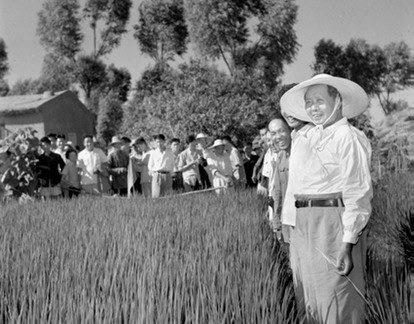Aegis: Preventing Crimes Against Humanity, 21 September 2010
In our post-modern world you sometimes see people wearing t-shirts bearing a hammer-and-sickle or a portrait of Mao. It would be nice to think they are being ironic, but safer to assume they are being ignorant of the crimes committed in utopia's name.
I have a friend from university who still describes himself as a Maoist. On occasion I have raised the issue of Mao's crimes with him, in a po-faced sort of way. I even had the bizarre experience of listening to him describe his amazement at finding himself going out with a girl who voted Conservative - as if modern British Conservatism is beyond the moral pale while Maoism is firmly within the bounds of acceptability.
I shall shortly be lending him Frank Dikötter's Mao's Great Famine. Dikötter has pulled off the rare feat of amassing vast swathes of previously unknown detail from provincial archives, while managing to maintaining mastership over both the book's narrative flow and the clarity of his prose.
The numbers are sadly numbing in their enormity. He estimates that at least 45 million people died unnecessarily between 1958 and 1962.
To those unfamiliar with Sen's work 'famine' can seem a passive word, something to which the Gods subject human beings to at their whim. Mao's Great Famine was an active, aggressive tool of political power. Mao's personality was central (some have categorised Mao's behaviour to Borderline Personality Disorder - see Evil Genes: Why Rome Fell, Hitler Rose, Enron Failed, and My Sister Stole My Mother's Boyfriend by Barbara Oakley): narcissistic, impulsive and Machiavellen, he responded to Khruschev's speech declaring the the USSR would leapfrog the USA's industrial production record, by declaring that Communist China would overtake the U.K. Potential opponents at the top were humiliated into declaring loyalty to Mao, realistic cadres who doubted the efficacy of requiring villagers to melt down cooking pots to make into steel ingots were denounced as conservative rightists, and everyone stretched to assert their fealty to the centrally driven targets. Harvests were neglected while peasants were press ganged into huge irrigation, dam building or other industrial projects.
The result was famine.
Mao's response was a glacial indifference to human suffering. Worse, again taking their lead from the top, local cadres used violence as a tool to meet targets, destroy local opponents and assert their authority. Food was used as a weapon, held back from 'rightist Conservatives'. Local cadres beat and killed active opponents, doubters and the innocent alike. Dikötter estimates that, of the 45 million who died, 6 to 8 per cent were tortured to death or summarily killed: 2.5 million people.
The similarities to the famine in North Korea in the 1990s are unnerving: a lack of institutional checks and balances over a narcissistic and impulsive leader, coupled with an ideology that favours statistics over human well being, and a stubborn refusal to change course in the face of mounting evidence of failure.
I once visited China as a guest of a Government aligned NGO, partly to learn more about Japanese war crimes during the Second World War. Towards the end of the visit, and with someone with whom I thought I had built some trust, I raised the issue of Mao and his crimes. The response of my host was an embarassed silence.
Mao's portrait still adorns Tiannemen square, so his reticence is perhaps understandable. The beliefs of my Maoist friend are not.

